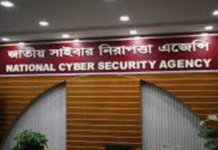It’s going to introduce online diploma in journalism
Bangladesh Open University (BOU) is set to launch its first full online academic programmes very soon as part of its plan to turn it into a full-fledged digital university by 2016, moving one step forward with the government’s vision to establish Digital Bangladesh.
The BOU, the country’s lone off-campus public university, will also start distributing e-books among its students from June this year as part of its move to stop distributing printed books in the future.
“Structural development to turn it into a full-fledged digital University is at the last stage while we’re now working on technical aspects. I think the demand of the university will increase once it is turned into a digital one,” BOU vice chancellor Prof Dr MA Mannan told UNB at his office at the university’s Gazipur head office recently.
“We’ll introduce online diploma in journalism and media studies and M Ed courses. The diploma on journalism will be offered for those professional journalists who have different academic background other than journalism, while the master’s degree course for those who obtained honours degree in journalism but yet to receive master’s,” Mannan said.
The students will meet once a month in a classroom lecture and they will receive education materials online other time, Mannan added.
The VC, who took over charges in 2013, said the BOU will introduce honours and master’s degree courses in journalism and media studies in phases.
To turn the university into a digital one, the BOU has taken steps to introduce web TV and radio utilising its own manpower, he said.
“We’ve already started test transmission of our web TV and Radio. I hope it’ll go into formal transmission in July this year,” the VC said.
SM Keramat Ali, director, Media division of BOU said initially the web TV and radio will broadcast 1 hour programme every day. It will broadcast 12-hour academic programme every day in phases.
In reply to a question whether the students will able to watch internet TV without disruption due to slow speed of internet, the media director said, “I think there’ll be no problem as 256 mbps speed will be needed to watch internet TV. The speed is available in our country.”
As part of its digitisation programme, the BOU authorities have set up Interactive Virtual Class Room (IVCR) on the main campus and at two regional centers with sophisticated equipment.
“We’ve set up Interactive Virtual Class Rooms (IVCRs) on the main campus and at two regional centers. We’ll set up Interactive Virtual Class Rooms in other 10 regional centers in phases,” the VC added.
Dr Fazleah Ali, founding director of E-learning Center, said through IVCR, students can take part in their classes through video conferencing. “It’ll enable renowned academicians of different universities to take classes.”
The VC said the BOU authorities would not distribute printed books among its students in the future as all books will be available in the BOU’s website by June this year. “We’ve given 250 books out of 450 on the internet as e-books. And the rest books will be available online by June this year,” he added.
About the present digitisation programme of the university, MA Mannan said the university has partially introduced online admission system. “Students are receiving results and other information through SMS.”
“We’ve been receiving cooperation from the government for its digitisation. However, to turn the university into a fully digital one, it needs more financial and technical support from the government,” he added.
In reply to a question whether the BOU has been successful in fulfilling its aim which was established in 1992, the VC said, “I think the university is almost successful in fulfilling its aim. In 2012, there were three lakh students in the university…now the number is six lakh. And we’ve a target to raise the number to 10 lakh by 2016.”
About the standard of education of the university, he said, “I believe if our students properly utilize our education materials, their standard will definitely mark an improvement.”
Asked about the demand of its students in the job market, the VC said there is no specific data in this regard, but a large number of students are working in NGOs and other organisations on completion of degrees.
Source: Dhaka Tribune









